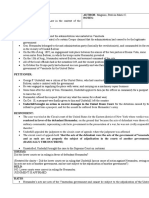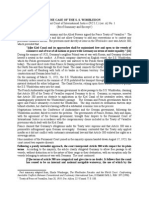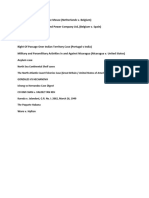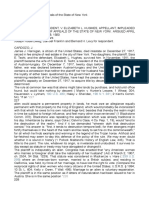100%(2)100% found this document useful (2 votes)
1K viewsNationality Decrees Issued in Tunis and Morocco
Nationality Decrees Issued in Tunis and Morocco
Uploaded by
Brian Jonathan ParaanThe document summarizes a case brought before the Permanent Court of International Justice (PCIJ) regarding nationality decrees issued in Tunisia and Morocco. The decrees automatically granted French nationality to people born in those territories to parents who were born there. The British government protested and wanted the PCIJ to rule on the matter. However, the PCIJ issued an advisory opinion stating that nationality is a domestic matter outside its jurisdiction. As a result, the disputing governments agreed those in Tunisia born to British parents could renounce French citizenship, but future generations would not have that option.
Copyright:
© All Rights Reserved
Available Formats
Download as DOCX, PDF, TXT or read online from Scribd
Nationality Decrees Issued in Tunis and Morocco
Nationality Decrees Issued in Tunis and Morocco
Uploaded by
Brian Jonathan Paraan100%(2)100% found this document useful (2 votes)
1K views1 pageThe document summarizes a case brought before the Permanent Court of International Justice (PCIJ) regarding nationality decrees issued in Tunisia and Morocco. The decrees automatically granted French nationality to people born in those territories to parents who were born there. The British government protested and wanted the PCIJ to rule on the matter. However, the PCIJ issued an advisory opinion stating that nationality is a domestic matter outside its jurisdiction. As a result, the disputing governments agreed those in Tunisia born to British parents could renounce French citizenship, but future generations would not have that option.
Original Description:
Nationality Public International Law
Copyright
© © All Rights Reserved
Available Formats
DOCX, PDF, TXT or read online from Scribd
Share this document
Did you find this document useful?
Is this content inappropriate?
The document summarizes a case brought before the Permanent Court of International Justice (PCIJ) regarding nationality decrees issued in Tunisia and Morocco. The decrees automatically granted French nationality to people born in those territories to parents who were born there. The British government protested and wanted the PCIJ to rule on the matter. However, the PCIJ issued an advisory opinion stating that nationality is a domestic matter outside its jurisdiction. As a result, the disputing governments agreed those in Tunisia born to British parents could renounce French citizenship, but future generations would not have that option.
Copyright:
© All Rights Reserved
Available Formats
Download as DOCX, PDF, TXT or read online from Scribd
Download as docx, pdf, or txt
100%(2)100% found this document useful (2 votes)
1K views1 pageNationality Decrees Issued in Tunis and Morocco
Nationality Decrees Issued in Tunis and Morocco
Uploaded by
Brian Jonathan ParaanThe document summarizes a case brought before the Permanent Court of International Justice (PCIJ) regarding nationality decrees issued in Tunisia and Morocco. The decrees automatically granted French nationality to people born in those territories to parents who were born there. The British government protested and wanted the PCIJ to rule on the matter. However, the PCIJ issued an advisory opinion stating that nationality is a domestic matter outside its jurisdiction. As a result, the disputing governments agreed those in Tunisia born to British parents could renounce French citizenship, but future generations would not have that option.
Copyright:
© All Rights Reserved
Available Formats
Download as DOCX, PDF, TXT or read online from Scribd
Download as docx, pdf, or txt
You are on page 1of 1
Nationality and Statelessness
NATIONALITY DECREES IN TUNIS AND MOROCCO
PCIJ, February 7, 1923
FACTS
On November 8th, 1921, a Decree was promulgated by the Bey of Tunis, the first article
of which enacts as follows: With the exception of citizens, subjects or nationals of the
Protecting Power (other than our own subjects), every person born in the territory of our
Kingdom of parents one of whom was also born there, is a Tunisian, subject to the provisions of
conventions or treaties binding the Tunisian Government. On the same date, the President of the
French Republic issued a Decree of which the first article was as follows: Every person born in
the Regency of Tunis of parents of whom one, justiciable as a foreigner in the French Courts of
the Protectorate, was also born there, is French. Similar legislation was introduced at the same
time in Morocco (French Zone). The British Government protested the decree made by the
French Government and suggested that the matter should be presented to the Permanent Court of
International Justice. The French Government declined stating that nationality is not a matter that
is cognizable by the court. The British Government still submitted the matter to the PCIJ.
ISSUE
Whether or not the PCIJ has jurisdiction over cases of nationality
HELD
The PCIJ promulgated an advisory opinion stating that nationality is a matter that is purely
domestic and not within the jurisdiction of international courts. Matters involving nationality
depend on the development of international relations regarding the subject matter. The PCIJ did
not decide the case based on its merits and merely made an advisory opinion stating that the
matter should be resolved solely by the disputing governments. The advisory opinion of the PCIJ
led to the exchange of notes between the two governments wherein it was agreed that all those
that were born in Tunisia to British Parents in the first generation shall be given the option to
denounce French citizenship and every generation thereafter shall not be given the same option.
The decree effecting Morocco was not delved into as the Decree was not questioned by the
British Government.
You might also like
- Clipperton Island CaseDocument2 pagesClipperton Island Caseronald100% (7)
- Legal Status of Eastern Greenland CaseDocument8 pagesLegal Status of Eastern Greenland CaseFatzie MendozaNo ratings yet
- Diplomatic and Consular LawDocument8 pagesDiplomatic and Consular LawMiguel100% (1)
- Caire Claim CaseDocument1 pageCaire Claim CaseLarissa100% (2)
- Temple of Preah Vihear - Cambodia v. ThailandDocument5 pagesTemple of Preah Vihear - Cambodia v. ThailandTippy Dos Santos100% (2)
- Dispute Between Texaco Overseas Petroleum Co. and Government of LibyaDocument1 pageDispute Between Texaco Overseas Petroleum Co. and Government of LibyaAiza OrdoñoNo ratings yet
- Island of Palmas Case (United States vs. The Netherlands)Document2 pagesIsland of Palmas Case (United States vs. The Netherlands)Amielle Canillo75% (4)
- Yugoslavia Vs UsDocument1 pageYugoslavia Vs UsangelescrishanneNo ratings yet
- Ferro Chemicals, Inc., V. Antonio Garcia, Et Al. G.R. No. 168134 FactsDocument3 pagesFerro Chemicals, Inc., V. Antonio Garcia, Et Al. G.R. No. 168134 FactsBrian Jonathan Paraan100% (1)
- Underhill v. Hernandez (Magsino)Document2 pagesUnderhill v. Hernandez (Magsino)Trxc Magsino100% (1)
- Chorzow Factory Case DigestDocument3 pagesChorzow Factory Case DigestBinkee Villarama100% (3)
- Dissenting Opinion by Judge Tanaka On The South West Africa CasesDocument3 pagesDissenting Opinion by Judge Tanaka On The South West Africa CasesSelynn Co33% (3)
- Joyce Vs Director of Public Prosecution PDFDocument1 pageJoyce Vs Director of Public Prosecution PDFEllis LagascaNo ratings yet
- 33 Case Concerning Avena and Other Mexican NationalsDocument2 pages33 Case Concerning Avena and Other Mexican NationalsJulius ManaloNo ratings yet
- Can International Law Be Called True Law International Law EssayDocument3 pagesCan International Law Be Called True Law International Law EssayAngna DewanNo ratings yet
- Island of Las Palmas Case DigestDocument3 pagesIsland of Las Palmas Case DigestMatthew WittNo ratings yet
- The Tinoco Arbitration - Case PresentationDocument3 pagesThe Tinoco Arbitration - Case PresentationKhairul Idzwan100% (14)
- North Sea Continental Shelf Case SummaryDocument4 pagesNorth Sea Continental Shelf Case SummaryChristine Rose Bonilla Likigan100% (1)
- Subjects of International LawDocument46 pagesSubjects of International Lawgilberthufana446877100% (4)
- Nottebohm Case DigestDocument2 pagesNottebohm Case DigestJazztine Artizuela100% (3)
- Haile Selassie vs. Cable Wireless (1938) FactsDocument10 pagesHaile Selassie vs. Cable Wireless (1938) FactsJoselle ReyesNo ratings yet
- Nicaragua Vs United States Case BriefDocument12 pagesNicaragua Vs United States Case Briefseventhwitch100% (1)
- Lotus Case, Ct. Rep. 20 FactsDocument2 pagesLotus Case, Ct. Rep. 20 FactsLaila Ismael SalisaNo ratings yet
- Barcelona Traction Case (1970)Document3 pagesBarcelona Traction Case (1970)Ridzanna Abdulgafur100% (1)
- Overview of The Case: East Timor (Portugal v. Australia)Document4 pagesOverview of The Case: East Timor (Portugal v. Australia)Mary Leanda100% (1)
- Zdigest Perio Santos V MacaraigDocument4 pagesZdigest Perio Santos V MacaraigCindy Ann SilvaNo ratings yet
- The Austro-German Customs Union CaseDocument2 pagesThe Austro-German Customs Union CaseErika Mariz Cunanan100% (1)
- Williams vs. BruffyDocument4 pagesWilliams vs. BruffyJey RhyNo ratings yet
- Nottebohm CaseDocument2 pagesNottebohm CaseIanLightPajaroNo ratings yet
- Notor vs. Martinez Case DigestDocument1 pageNotor vs. Martinez Case DigestConrado JimenezNo ratings yet
- Case Concerning US Diplomatic and Consular Staff in TehranDocument5 pagesCase Concerning US Diplomatic and Consular Staff in Tehrankathrynmaydeveza100% (1)
- The Nottebohm CaseDocument1 pageThe Nottebohm Casecrlstinaaa100% (4)
- Prosecutor Vs TadicDocument7 pagesProsecutor Vs TadicMichael Parreño Villagracia100% (1)
- PIL - Fisheries Jurisdiction CaseDocument4 pagesPIL - Fisheries Jurisdiction Casemjpjore100% (1)
- Case of The Ss Wimbledon FTDocument2 pagesCase of The Ss Wimbledon FTseventhwitchNo ratings yet
- The Asylum Case (Digest)Document2 pagesThe Asylum Case (Digest)Laila Ismael Salisa100% (5)
- Armed Activities On The Territory of The Congo (DR Congo v. Uganda)Document4 pagesArmed Activities On The Territory of The Congo (DR Congo v. Uganda)Dane Nuesa100% (1)
- Nanni V Pace and The Sovereign Order of MaltaDocument2 pagesNanni V Pace and The Sovereign Order of MaltaAleana Cecilia Bantolo100% (1)
- The Canevaro ClaimDocument1 pageThe Canevaro ClaimJayce PajadanNo ratings yet
- Pil CasesDocument51 pagesPil CasesAlyssa Clarizze MalaluanNo ratings yet
- PIL DigestDocument52 pagesPIL DigestAly ComiaNo ratings yet
- Techt Vs HughesDocument11 pagesTecht Vs HughesdavidNo ratings yet
- Lotus CaseDocument3 pagesLotus CaseFatzie Mendoza100% (1)
- Subjects and Objects of International LawDocument36 pagesSubjects and Objects of International LawKenn Espina100% (2)
- Western Sahara CaseDocument5 pagesWestern Sahara CaseJesa FormaranNo ratings yet
- Wimbledon CaseDocument2 pagesWimbledon CaseXyra Krezel GajeteNo ratings yet
- PIL Presentation G1Document81 pagesPIL Presentation G1Ax ValerioNo ratings yet
- World Health Organization v. Aquino (48 SCRA 243) : Philippine Government and WHODocument2 pagesWorld Health Organization v. Aquino (48 SCRA 243) : Philippine Government and WHOLe Obm SizzlingNo ratings yet
- Nottebohm CaseDocument1 pageNottebohm CaseArgel Joseph CosmeNo ratings yet
- Hopkins (U.S.A.) v. United Mexican StatesDocument1 pageHopkins (U.S.A.) v. United Mexican StatesPNP MayoyaoNo ratings yet
- 3-183 Trendex Trading V Bank of Nigeria 3-183 Trendex Trading V Bank of NigeriaDocument1 page3-183 Trendex Trading V Bank of Nigeria 3-183 Trendex Trading V Bank of NigeriaZhanika Marie CarbonellNo ratings yet
- Trail Smelter Case DigestDocument6 pagesTrail Smelter Case DigestKobe Lawrence Veneracion100% (1)
- Clipperton Island CaseDocument1 pageClipperton Island CaseZyldjyh C. Pactol-Portuguez100% (4)
- Public International Law ConceptsDocument4 pagesPublic International Law ConceptsLoueljie AntiguaNo ratings yet
- US Vs Iran Case DigestDocument2 pagesUS Vs Iran Case DigestShiela Marie Gonzales100% (1)
- 002 Asylum CaseDocument5 pages002 Asylum Caseangelo6chingNo ratings yet
- Barcelona Traction CaseDocument3 pagesBarcelona Traction CaseMaria Jesse Anne Gloria100% (1)
- Public International Law Case DigestsDocument30 pagesPublic International Law Case DigestsDyrene Rosario Ungsod100% (1)
- Nationality Decrees Issued in Tunis and Morocco PDFDocument18 pagesNationality Decrees Issued in Tunis and Morocco PDFSalaam Bey®No ratings yet
- Customary International LawCase Lotus CaseDocument14 pagesCustomary International LawCase Lotus CasefainomenoNo ratings yet
- MeeraPareek 22010768 PILTakeHomeDocument8 pagesMeeraPareek 22010768 PILTakeHomeMeeraNo ratings yet
- LAND BANK v. KhoDocument1 pageLAND BANK v. KhoBrian Jonathan Paraan100% (2)
- Philippine Bloomig Mills and Ching Vs CaDocument3 pagesPhilippine Bloomig Mills and Ching Vs CaBrian Jonathan ParaanNo ratings yet
- PCIB Vs CaDocument2 pagesPCIB Vs CaBrian Jonathan ParaanNo ratings yet
- Philippine Deposit Insurance Corporation vs. BirDocument2 pagesPhilippine Deposit Insurance Corporation vs. BirBrian Jonathan ParaanNo ratings yet
- Pascual Vs RamosDocument2 pagesPascual Vs RamosBrian Jonathan ParaanNo ratings yet
- Venzon Vs Rural Bank of BuenavistaDocument2 pagesVenzon Vs Rural Bank of BuenavistaBrian Jonathan ParaanNo ratings yet
- Palanca Vs GuidesDocument2 pagesPalanca Vs GuidesBrian Jonathan Paraan100% (1)
- Tibajia Vs CaDocument2 pagesTibajia Vs CaBrian Jonathan ParaanNo ratings yet
- Banco Filipino Savings Vs Court of AppealsDocument2 pagesBanco Filipino Savings Vs Court of AppealsBrian Jonathan ParaanNo ratings yet
- PH Credit Corporation Vs CADocument1 pagePH Credit Corporation Vs CABrian Jonathan ParaanNo ratings yet
- PDICDocument16 pagesPDICBrian Jonathan ParaanNo ratings yet
- Philippine Banking Corporation Vs DyDocument2 pagesPhilippine Banking Corporation Vs DyBrian Jonathan ParaanNo ratings yet
- Sayo V Chief of PoliceDocument5 pagesSayo V Chief of PoliceBrian Jonathan ParaanNo ratings yet
- AGDAO v. MaramionDocument3 pagesAGDAO v. MaramionBrian Jonathan Paraan100% (1)
- Labor CasesDocument115 pagesLabor CasesBrian Jonathan ParaanNo ratings yet
- Arco Pulp v. LimDocument2 pagesArco Pulp v. LimBrian Jonathan ParaanNo ratings yet
- Nacar Vs Gallery FramesDocument2 pagesNacar Vs Gallery FramesBrian Jonathan ParaanNo ratings yet
- Mitsubishi Motors Philippines Corporation v. Bureau of Customs G.R. No. 209830 June 17, 2015Document3 pagesMitsubishi Motors Philippines Corporation v. Bureau of Customs G.R. No. 209830 June 17, 2015Brian Jonathan ParaanNo ratings yet
- Case Digests 08Document8 pagesCase Digests 08Brian Jonathan Paraan100% (1)
- Nippon Express V Cir Case No. 5Document2 pagesNippon Express V Cir Case No. 5Brian Jonathan Paraan100% (3)
- Cases 1-7 CorpoDocument12 pagesCases 1-7 CorpoBrian Jonathan ParaanNo ratings yet
- 06 Gabriel V Court of Tax AppealsDocument8 pages06 Gabriel V Court of Tax AppealsBrian Jonathan ParaanNo ratings yet
- Process For P.I.Document4 pagesProcess For P.I.Brian Jonathan ParaanNo ratings yet
- Umil V RamosDocument11 pagesUmil V RamosBrian Jonathan ParaanNo ratings yet
- 2 Cases For PropertyDocument6 pages2 Cases For PropertyBrian Jonathan ParaanNo ratings yet
- Reformina Vs TomolDocument2 pagesReformina Vs TomolBrian Jonathan ParaanNo ratings yet
- Official Gazette of The Republic of The PhilippinesDocument4 pagesOfficial Gazette of The Republic of The PhilippinesBrian Jonathan ParaanNo ratings yet























































































